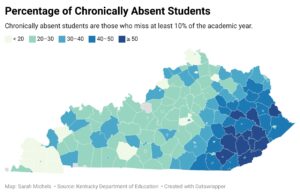‘We have a crisis.’ Legislators address chronic absenteeism in KY schools
Published 1:24 pm Friday, March 8, 2024

- FRANKFORT, March 7 - Rep. Jared Bauman, R-Louisville, presents House Bill 611, an act related to truancy, on the House floor Thursday. (LRC Public Information)
FRANKFORT — During the 2022-23 academic year, 29% of Kentucky public school students were deemed chronically absent, according to Kentucky Department of Education data.
Students who miss at least 10% of the academic year are considered chronically absent.
“We don’t have a problem in this state,” said Rep. James Tipton, R-Taylorsville. “We have a crisis.”
Tipton said this on the House floor Thursday, where Louisville Republican Rep. Jared Bauman’s bill addressing truancy passed 79-15, with unanimous Republican support and a few Democrats’ support.
What would the bill do?
House Bill 611 would add some teeth to Kentucky truancy laws. It would require schools’ directors of pupil personnel to report students who miss school for 15 days or more without an excused absence.
Students would be reported to the county attorney under an educational neglect complaint to determine “appropriate court intervention, if any.”
It distinguishes between grades K-5 and grades 6-12, clarifying that parents or guardians are responsible for the younger group and adding a requirement in order for the older group to be reported.
The older group would have to not only miss 15 days of school without an approved excuse, but also must have been found by the court to be a “habitual truant.”
Kentucky law states that students become habitual truants when they have been absent or tardy three or more days without an excuse at least two times in one school year.
Once reported, the county attorney could either pursue formal court action or develop a diversion agreement for a child.
Diversion agreements typically involve a family accountability, intervention and response team, made up of law enforcement, school personnel, social workers and mental health support.
FAIR teams currently have 90 days to take action on a child’s case. This bill would lower that to 30 days. It would also extend the length of diversion programs from six months to a year.
During the diversion period, if a child misses an additional four unexcused days, they will immediately be referred to the county attorney again, who then would pursue formal court action.
Not a ‘perfect bill:’ Floor discussion
In Bauman’s home district of Jefferson County Public Schools, 38% of students are chronically absent.
Even so, JCPS barely cracks the top quarter of school districts with the highest chronic absenteeism rates. According to Kentucky Department of Education data, 37 school districts have over 40% of students deemed chronically absent and in 13 districts, at least half of the student body is considered chronically absent.

According to Kentucky Department of Education data, 29% of Kentucky public school students were deemed chronically absent during the 2022-23 academic year.
Higher rates of chronic absenteeism are concentrated in Eastern Kentucky, where some districts have over half of their student body considered chronically absent.
The higher rates are mostly concentrated in Eastern Kentucky.
“Our very future is at stake here,” Bauman said.
Bauman said he met with the county attorneys association, which supports this bill. They recognize that this has the potential to overwhelm the system, Bauman said, but emphasized that was not a reason to “do nothing.”
Rep. Timmy Truett, R-McKee, said that this isn’t a “perfect bill.”
“This is a start,” he said. “I promise you we will come back next year to try to tweak this and add more teeth to this bill because truancy is that important, students being in the classroom is that important.”
He said that it won’t impact the discretion of directors of pupil personnel in deciding which cases are excused and which are not. Truett used the example of a child who is often absent due to homelessness and a lack of transportation as one case where a DPP could consider that an excused absence.
Several Democrats were concerned that this bill does not get to the root cause of truancy. Rep. Keturah Herron, D-Louisville, was one of them.
As a former court-designated worker and member of a FAIR team, Herron said that these changes may only hurt some families. If the issue is transportation or an alarm clock, she said that it may take time for the situation to improve—time not provided under the four-day unexcused absence limit during diversion periods included in the bill.
Herron said that the diversion system is already working as it should. Rep. Rachel Roarx, D-Louisville, agreed.
She said that the legislature should focus on getting more resources into schools and keeping as many kids out of court as possible.
“We have so many families who are caught in cycles of system involvement and can’t get their head above water,” she said. “And those systems that we hopefully intend to help people and provide those wraparound services often become the overburdensome processes that actually keep them from doing so.”
Several Republicans noted that while there may be issues with the bill, the early intervention is worth it.
Rep. Jason Petrie, R-Elkton, said that children are missing key building blocks at a time when one day of instruction is critical.
Rep. James Tipton, R-Taylorsville, also strongly supported the bill.
“If these children are not in school, how will they have the opportunity to succeed in life?,” he said. “…It comes down to accountability and responsibility. And I’m gonna be frank; we have too many adults that are not exercising responsibility for their children or the children in their care.





